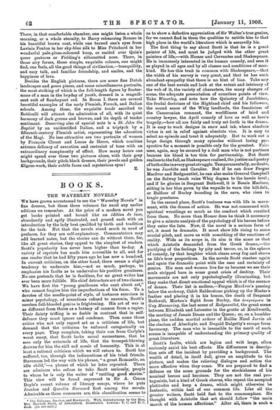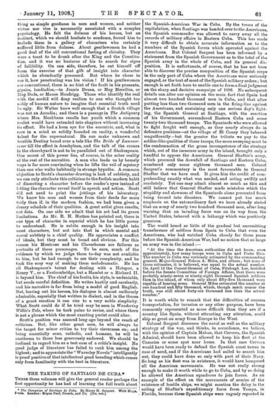BOOKS.
THE WAVERLEY NOVELS.*
WE have grown accustomed to see the " Waverley Novels" in fine dresses, but these three volumes far excel any earlier editions we remember. At the price of a modern novel you get books printed and bound like an edition de luxe, abundantly and aptly illustrated, and graced each with an introduction by the lady best qaalified by birth and tradition for the task. Not that the novels stand much in need of prefaces, for they are self-explanatory. Commentators may add learned notes, but the stories can do without them, for, like all great stories, they appeal to the simplest of readers. Scott's popularity has never been higher than to-day. A variety of reprints has made him accessible to all, and for one reader that he had fifty years ago he has now a hundred. In current criticism, on the other hand, there seems a slight tendency to underrate him,—not so much, perhaps, to emphasise his faults as to undervalue his positive greatness. No one pretends that he is faultless, for no great writer has ever been more fallible. His chief detractors are of two classes. We have first the "young gentlemen who cant about art," who cannot forgive him the imperfections of his form. To a devotee of the needle-point of style, of tortuous exercises in minor psychology, of sensations refined to anaemia, Scott's careless full-blooded genius is frightening. His art of war is as different from theirs as a battery of cannon from a rapier. Their dainty trifling is so feeble in contrast that in self- defence they must ignore and condemn. Then come those critics who not only regard art as a criticism of life, but demand that the criticism be enforced categorically on every page. They complain, taking their cue from Carlyle's worst essay, that Scott lacks moral earnestness, that he sees only the externals of life, that the trumpet-blowing drowns for him the still sad music of humanity. This is at least a rational criticism which we will return to. Scott has suffered, too, through the indiscretions of his tried friends. Stevenson led the way with his phrase, "a great Romantic, an idle child,"—a phrase of which he later repented. There are admirers who refuse to take Scott seriously, people to whom he is only the writer of "rattling good stories." This view will be found expressed in Sir A. Conan Doyle's recent volume of literary essays, where he puts Ivanhoe and Quentin Durward first among the novels. Admirable as these romances are, this classification seems to • The Talisnian, Ira,lhoe, and Kenilworth. With Introductions by the Hon. Mrs. Maxwell Scott, of Abbotsford. Illustrated. London: T. C. and E. C. Jack. [Gs net each.]
us to show a defective appreciation of Sir Walter's true genius, for we cannot find in them the qualities to entitle him to that high place in the world's literature which is assuredly his.
The first thing to say about Scott is that he is a great painter of life, and must be judged with the other great painters of life,—with Homer and Cervantes and Shakespeare. He is immensely interested in the human comedy, and sees it as played in all ages and by all classes and conditions of man- kind. He has this trait in common with Shakespeare,—that the width of his survey is very great, and that he has such abundant sympathy that there is no hint of bias. Take any one of the best novels and look at the extent and intricacy of the web of it, the variety of characters, the many changes of scene, the adequate presentation of countless points of view. Take Waverley, and note how the Quixotry of Jacobitisin, the feudal doctrines of the Highland chief and his followers, the sound sense of the Whig landlords, the fanaticism of the Cameronian remnant, the worldliness of laird and country lawyer, the April comedy of love as well as love's tragedy,—how all are fairly and truly set forth in the drama. It is easy to work designs in snow and ink, where absolute virtue is set in relief against absolute vice. It is easy to select an episode and treat it adequately. But to work out a large design through many episodes without losing per- spective for a moment is possible only for the greatest. Fair- ness, again, may be secured by a dull man who is not partisan because his blood is too thin for partisanship. But Scott realises to the full, as Shakespeare realised, the justice and poetry of both sides in every great struggle. Temperamentally, no doubt, he was Jacobite and Cavalier. But if he can draw Fergus MacIvor and Redgauntlet, he can also make General Campbell on the Solway beach raise Whig dogma to the heroic level ; and if he glories in Sergeant Bothwell, it is Bessie Maclure, sitting in her blue gown by the wayside to warn the hill-folk, or Balfour of Burley brooding in the cave, who rises to tragic greatness.
Scott's faults, which are legion and writ large, often curiously assist his best effects. His diffuseness in descrip- tion sets off the incident by providing a background. The wealth of detail, in itself dull, gives an amplitude to the picture, and makes the relieving dialogue and action the more effective when they come. We are prepared to find a defence on the same grounds for the stockishness of his nominal heroes and heroines. They are not the real pro- tagonists, but a kind of Greek chorus, who repeat the accepted platitudes and keep a drama, which might otherwise be fantastic, within hail of our common life. Like all the greater writers, Scott held fast to the commonplace. He thought with Aristotle that art should follow "the main march of the human affections." After all, there is such a
thing as simple goodness ba men and women, and neither virtue nor vice is necessarily associated with a complex psychology. He felt the dulness of his heroes, but an instinct, which we should hesitate to condemn, forced him to include them in a gallery of characters who certainly suffered little from dulness. About gentlewomen he bad a good deal of the old conventional feeling of chivalry. They were a toast to be drunk after the King and the Constitu- tion, and it was no business of his to search for signs of fallibility. On one side, therefore, he cut himself off from the exercise of that gift of insight into character
which he abundantly possessed. But where he chose to use it, how penetrating was his vision I If his gentlewomen are conventional, there is no hint of tho fault in his peasants, gipsies, landladies,—in Jeanie Deans, or Meg Merrilies, or Meg Dods, or Meuse Headrigg. 'Those who identify the real with the sordid will deny realism to one who thought too nobly of human nature to imagine that essential truth need be ugly. Sir Walter knew well enough that a Scotch village was not an Arcadia; and there is a passage in The Antiquary where Mrs. Heukbane recalls her youth which a common realist would have extended into chapters without increasing its effect. He had a keen eye for the eccentric, and, what is rare in a mind so solidly founded on reality, a wonderful talent for the supernatural. He can make unknown and terrible Destiny brood over a tale like The Bride of Lammer- moor till the effect is Aeschylean, and the talk of the crones in the churchyard is not to be paralleled out of Shakespeare. One secret of this power lies, of course, in the sober reality of the rest of the narrative. A man who leads us by homely ways is far more convincing when he lifts the veil of mystery than one who walks habitually in strange bypaths. A common objection to Scott's character-drawing is lack of subtlety, and we can only attribute this criticism to the foolish modern habit of dissecting a character before the reader's eyes instead of letting the character reveal itself in speech and action. 'Scott did not need to print the jottings of his laboratory. We know his men and women from their deeds far more truly than if, in the modern fashion, we had been given a dreary schedule of their qualities. A great artist gives results, not data. On one side we admit that his art had its grave limitations. As Mr. It. H. Hutton has pointed out, there is one type of character in especial which he has little power to understand. He is subtle enough in his insight into most characters, but not into that in which mental and moral subtlety is a chief quality. He appreciates a conflict of ideals, but they must be broad and obvious. For this reason his Montrose and his Claverhouse are failures as portraits of these personages. To be sure, much of the evidence by which we judge them to-day was not available to him, but he had enough to see their complexity, and he took the easy way of making them melodramatic. He has all Shakespeare's talent for dealing with a Hotspur, a Remy V., or a Fa.ulconbridge, but a Hamlet or a Richard II. is beyond him. The chief of his faults, his style, is undeniable, bat needs careful definition. He writes hastily and carelessly, and his narrative is far from being a model of good English. But, leaving out his heroes, his dialogue is almost uniformly admirable, especially that written in dialect, and in the throes of a great emotion it can rise to a very toble simplicity. What Scott could do if he tried may be seen in Wandering Willie's Tale, where he took pains to revise, and where there
is not a phrase which the most exacting purist could alter. Scott's position was assured long ago beyond the reach of criticism. But, like other great men, he will always be the target for minor critics to try their cleverness on; and being essentially sane, catholic, and humane, he will be anathema to those leas generously endowed. We should be inclined to regard him as a test case of a critic's insight. No good judge of literature has failed to rank him among the highest; and to appreciate the " Waverley Novels" intelligently is proof positive of that intellectual good breeding which comes only from familiarity with the best in literature.











































 Previous page
Previous page